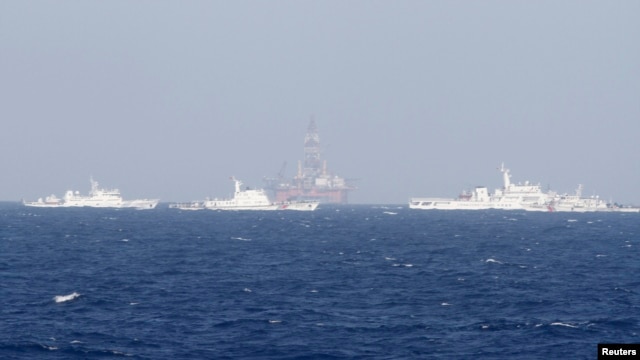China, Vietnam Blame Each Other for Fishing Boat Sinking
|
|
Date: 5/27/2014 12:37:44 PM
Sender: VOA
|

FILE - Chinese oil rig Haiyang Shi You 981 is seen surrounded by ships of China Coast Guard in the South China Sea, about 210 km (130 miles) off shore of Vietnam.
BEIJING — Vietnam and China are blaming each other after a Vietnamese fishing boat sank in the disputed South China Sea near where Beijing has placed an oil rig.
Authorities said collisions Tuesday between Chinese and Vietnamese fishing vessels caused the sinking of a Vietnamese boat in the South China Sea, 30 kilometers from a Chinese oil rig based in contested waters.
China’s Foreign Ministry says Vietnam is to blame for the incident.
Foreign Ministry spokesman Qin Gang says a Vietnamese fishing boat forcefully intruded in the area of China’s oil rig and capsized after ramming a Chinese boat. He said Vietnam’s dangerous actions were the direct cause of this incident and China urges Vietnam to safeguard normal navigation and fishing activities on the sea.
Vietnam says 40 Chinese fishing boats encircled and rammed a Vietnamese boat, causing it to sink. All 10 fishermen on the Vietnamese boat were rescued.
Vietnam says the $1 billion Chinese oil rig is in its exclusive economic zone. China claims nearly all of the South China Sea and maintains the rig is in its territorial waters.
China also announced the cancellation of some flights to Vietnam as tensions between the two countries continued to rise. During the past few weeks, violent protests in Vietnam against the oil rig resulted in the deaths of Chinese workers and looting of Chinese factories and businesses.
Renmin University International Relations Professor Xiaohe Cheng says both countries have violated a 2011 bilateral maritime pact. Less than one year ago Chinese Premier Li Keqiang recommitted to that pact in meetings with Vietnamese leaders.
“Both sides disregard the words and the spirit signed by the Chinese premier Li Keqiang and Vietnamese leaders," said Xiaohe. "That is bad not only for bilateral relations, but it is also bad for the regional situation in Southeast Asia.”
Many in China see Vietnam as historically a part of China and through online social media expressed support for China’s actions in the South China Sea.
Cheng says today’s tensions in the sea have roots in a battle over the Paracel Islands in 1974.
“Today’s dispute has historical routes in what happened in 1974 when a maritime military conflict between China and South Vietnam broke out, and South Vietnam’s military fleet was almost annihilated by Chinese naval forces," said Xiaohe.
That dispute was the first Sino-Vietnamese naval battle in the South China Sea.
Meanwhile, Ha Le, the deputy head of the Vietnam Fisheries Surveillance Department, told VOA's Vietnamese service that four fisheries officers were wounded Sunday after being hit by water cannons from Chinese vessels.
He said almost all of Vietnam’s vessels have been damaged by attacks from China’s vessels.
"We are now fighting by peaceful means, by propagandizing against China’s illegal invasion," he said. "In addition, we try to avoid any intentional clashes with Chinese vessels to minimize damages and casualties on our end."
He added that in addition to its military ships, Beijing has sent numerous fishing vessels to the area to disrupt Vietnam’s laws enforcement ships. He stressed that Vietnam has only dispatched civilian ships, including vessels from its maritime police.
A spokesman for Vietnam's national legislature has announced that the country is taking its final steps toward filing an international lawsuit against China for towing an oil rig into Vietnamese waters and attacking Vietnamese vessels.
Vietnamese Prime Minister Nguyen Tan Dung threatened legal action last week during a visit to the Philippines, which has a similar territorial dispute with China.
Manila challenged the legality of China's maritime claims to an international tribunal in The Hague. Beijing was angered by the move and has refused to participate in the case.
|
|
| |
